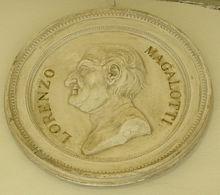Lorenzo Magalotti (writer)
Lorenzo Magalotti (born October 24, 1637 in Rome , † March 2, 1712 in Florence ) was an Italian scholar, poet and diplomat.
Life
Magalotti came from the Roman nobility, his father Ottavio was prefect of the Vatican post office. His uncle Lorenzo was a cardinal, his cousin Filippo rector of the University of Pisa.
He attended the Collegio Romano in Rome and the University of Pisa, where he first studied law and medicine and then mathematics with Galileo's pupil Vincenzo Viviani . Magalotti also became an ardent follower of Galileo's teachings. From 1660 Magalotti was secretary of the Accademia del Cimento , founded in 1657 , which in Florence, under the patronage of the Medici, was dedicated to experimental natural science in the spirit of Galileo. As secretary, he was also instrumental in the essays published in 1667 on the Academy's experiments, which were widely disseminated and influential throughout Europe. Later he lost interest in science, which was also introduced by the new Grand Duke Cosimo III. de 'Medici (from 1670) was little cared for. He became a diplomat in the service of the Medici and later a writer.
In 1664 he was entrusted with the supervision of the design of the Palazzo Pitti and made many contacts with artists. He learned English after making contact with the English who visited Florence and set out on a trip to the Netherlands in 1667. He was accompanied by his friend the architect Paolo Falconieri and in the Netherlands he was in the simultaneous visit of the Grand Duke of Tuscany Cosimo III. Medici involved. He did not accompany him to Hamburg, but then visited London, where he attended the Royal Society, including demonstration experiments by Robert Hooke , and Robert Boyle in Oxford . He then met Henri-Louis Habert de Montmor and Ismael Boulliau in Paris, among others, and then rejoined Cosimo Medici's official tour group to Spain, Portugal, England and the Netherlands and kept a diary. They drove back via Paris and arrived back in Florence on November 1, 1669. Magalotti was then on a diplomatic mission in Brussels, Cologne, the Netherlands, Hamburg, Copenhagen and Stockholm and in 1675 he was raised to the rank of count and became ambassador of Tuscany to the emperor in Vienna. In 1678 he was back in Florence. From 1689 to 1691 he was a State Councilor.
He now turned to poetry in the manner of Petrarch and anacreontic poems. He translated parts of The Lost Paradise by John Milton and poems by John Philips ( The Cyder , published posthumously in 1752, and Splendid Shilling ) and Edmund Waller (1606–1687) ( Battle of the Bermudas ) from English. He was friends with the French writer Charles de Marguetel de Saint-Denis de Saint-Evremond . He also commented on the first five chants of Dante's Inferno .
In 1709 he became a Fellow of the Royal Society .
Fonts
- Lettere sopra le terre odorose d'Europa e d'America dette volgarmente buccheri 1695
- Lettere familiari contro l'ateismo, 1719
- Lettere scientifiche ed erudite, 1721
- La donna immaginaria, 1690 (poem)
- Canzonette anacreontiche, 1723
- La madraselva, 1762
Web links
| personal data | |
|---|---|
| SURNAME | Magalotti, Lorenzo |
| BRIEF DESCRIPTION | Italian scholar, poet and diplomat |
| DATE OF BIRTH | October 24, 1637 |
| PLACE OF BIRTH | Rome |
| DATE OF DEATH | March 2, 1712 |
| Place of death | Florence |
